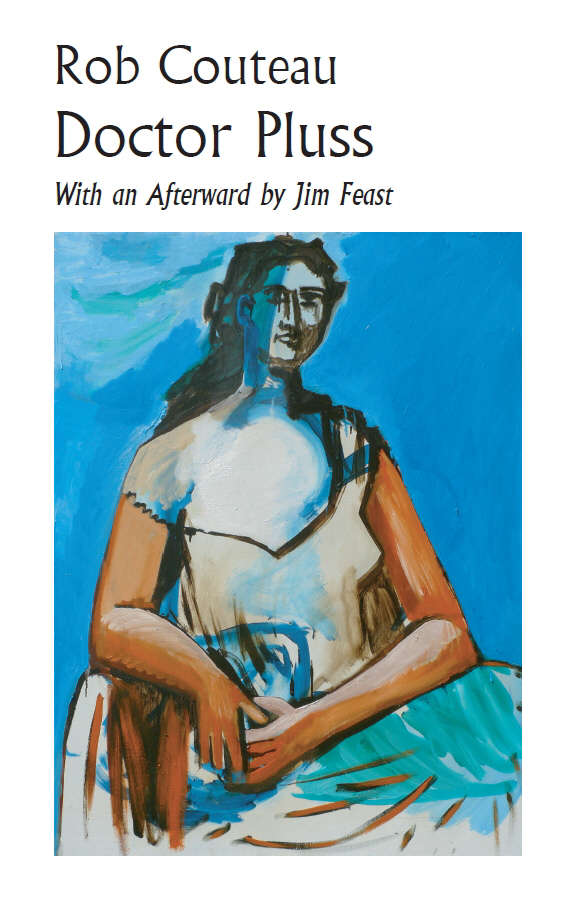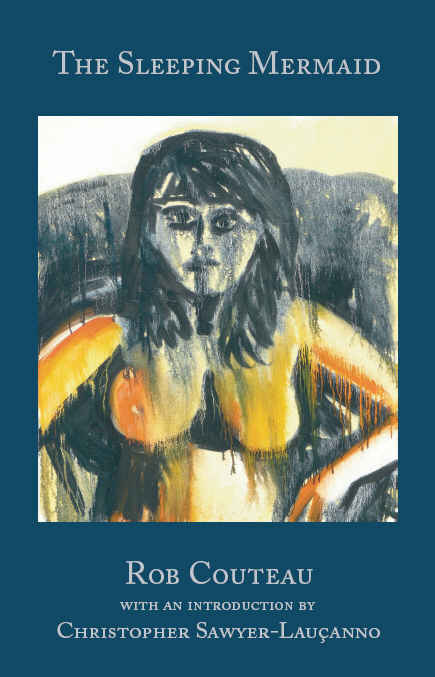|
An excerpt from the novel Doctor Pluss, by Rob Couteau |
 Published in: Hawaii Pacific Review, spring 2007 (HA: Honolulu) |
|
|
|
He coughed his way through the billows of cigarette smoke that whirled lazily around the room. Wall-length mirrors glared under flickering florescent lights. Battered chairs and worn-out sofas, gutted of stuffing and redolent with mold, were scattered about. Several skinny old men sat round a grimy table, sipping coffee. Stuart Myzer reclined on a wooden bench, a cup of coffee steaming beside him. He was so detached, so uninspired by life, that Pluss had come to admire the purity of his laziness and sloth. Besides eating and sleeping, his only remaining passion was to unmercifully tease the other patients who wandered about the asylum. Stuart was especially fond of annoying Angelica Pinn, who was often seen pushing a cart from which she dispensed used clothing and other tattered donations. Angelica was also prone to preach: a quality that deeply disturbed Stuart. Sermonizing, he complained, was an unbecoming form of behavior, especially for a fellow mental patient. He couldn’t comprehend why it was tolerated. After all, he reasoned, why bother getting committed if you can’t enjoy some peace and tranquility? If you can’t relish your free cup of morning coffee? One day, as Pluss listened to Stuart elaborate on the relationship between eternal peace and coffee, Angelica burst into the room. “I have faith in God! Faith! That’s what I have!” “Faith in God, Angelica?” Stuart assumed a soft, gentle tone as Angelica regarded him disdainfully. “Yes, Stuart, I do.” “Then why,” he chuckled, “did he make you mentally ill?” His booming laughter pealed across the room as Angelica, pouting and mumbling, pushed her cart round in circles until finally slipping away. Pluss questioned Stuart and several other patients, but no one had seen Carlos Urebos. He decided to recheck Carlos’s room but then discovered the elevator was stalled. While awaiting its descent, he observed the patients queuing at a dispensary. As the nurse cranked up the metal shutter and began distributing pills, he was overcome with a tingling sense of déjà vu. He concentrated on her regular, mechanical movement: her fingers nimbly selecting the tablets and patiently counting and administering them. Absorbed by her hypnotic gestures, he suddenly recalled a dream: He’d awoken that morning from an extraordinary scene: a group of patients was seated round an elegant dinner table. A brightly colored pill was placed on each white plate. They commented, with great cheer, on the cuisine. “Delicious Prolixen!” said one. “Marvelous Navane!” exclaimed another. “And the Thorazine, so well done!” “And have you tried the Stelazine? Quite a treat!” Indeed, it was a Mad Hatter’s party of psychotropic delights. Emerging from his reverie, he again pressed the elevator button and cursed at its delay. Then he remembered the letter. Unfolding a scrap of paper, he studied an uneven scrawl: DO
NOT FOLLOW It’s nothing to masturbate. In Puerto Rico, where I was sent to mate the she pig with the he pig, I used to watch them, and my penis had an erection. Instead of attacking the she pig, I’d masturbate. This saved me when, one night, in the park, I saw a pair of teens kissing and hugging. Instead of attacking the girl, I masturbated. The only reason the Bible forbids it is to warn us not to do it in public. Women do it too. But don’t kill me. You’ll get nothing by that. C.U. He crumpled the note as the elevator opened. A pungent odor drifted from the densely packed compartment. He squeezed in, wedged between the silent passengers, and waited impatiently. But it refused to budge. Others boarded, pushing him farther back, until the doors creaked to a close. As it rose with an ominous lunge, he amused himself with the thought of Sister Ignatius, who had handed him the note earlier that morning, reading and rereading Carlos’s distinctly pagan proclamations. He considered Carlos as exemplary of the independent, solitary type: patients who were better off left alone. When in need, they’d announce it in their unique, idiosyncratic manner. But until then they would drift through their respective, isolate worlds, following a path of indecipherable, impenetrable logic. Which was another way of saying that he knew very little about Carlos, other than the creation of his allegorical pig, his proclivity to cite biblical verse, and his therapeutic philosophy of liberated self-love. Carlos’s room was arranged in a neat sparse fashion. Other than a cot, an end table, and a folding chair, it was so devoid of possessions that it seemed austere rather than merely impoverished. Somberly painted religious icons, which hung along the wall beside the bed, highlighted this cloistral atmosphere. As he studied the images, he felt Carlos’s gaze following his every movement. In his late fifties, Carlos appeared to be much younger. With his lean, muscular frame and ruggedly handsome features, he resembled an attractive yet battered pugilist. And he was known to wield a dangerous physical force. His dossier warned that it didn’t take much to trigger his temper. Regarding him carefully now, Pluss was drawn by his paranoid demeanor. Carlos shifted restlessly in his chair until he finally blurted out: “I know what you’re thinking, doctor. I don’t go to church because God isn’t helping me. Because the problem I have is due to religion. In Puerto Rico, the ones who were going to kill me were Catholic. I don’t know why I was so mistreated. For seven years, I was locked in Manhattan State Psychiatric Hospital. Now, I have no friends, no relatives ... nothing.” Neither friends nor relatives, and now no religion. “Any dreams, Carlos? Sometimes they hold the key, you know.” Carlos stared menacingly at Pluss. He slowly approached, but then he continued past him, stopping abruptly at a sink in the next room. As he gazed at his reflection in the mirrored medicine cabinet, he grimaced, as if disgusted, and spat in the basin. Then he returned to the edge of his neatly made bed. Pluss leaned back in a creaking metal chair, trying to appear relaxed. “Dreams, doctor? When you’re sick from nervous illness, you get nightmares! With your mother! She stands above, points a gun, and says, ‘Do this, now! Or else: Boom! Boom! Boom!’” Lately, several of his patients had been besieged by Oedipal nightmares. Although it was easy to discount Freud’s rather literal interpretation, he felt they were, at the very least, bad news, signifying the submersion of a fragile ego by the overwhelming ennui of the great mother, psyche. “I’ll tell you why I’m troubled, doctor. People from my own family mugged me. Cursed me. Told a pack of lies. My ex-wife kept me awake at night, playing card games! They tried to make me sick! My own mother said nasty things. She wasn’t supposed to do that. And you know my sore-throat problem? She said I was making noise like a pig. That I wasn’t sick but was hot, for a woman! But I forgive her.” Carlos returned to the mirror and again examined himself. Pluss had never seen him so agitated. It was as if, in exploring his reflection, he could no longer find any trace of himself–as if all that remained were the glimmers of a spirit that had now come to possess him. After another fit of coughing, a streak of color had returned to his livid face. “Thank God, nature gives me some relief. Now, I don’t have so much phlegm to spit. Yes, my sore-throat problem has improved. Still, I hate my mother. They say a man should be at peace with his mama, but I don’t think so.” “Carlos, some are just,” he sighed, “bad mothers. And remember what Jesus said: ‘If any man comes to me, and hates not his father, and mother, and wife, and children, and brethren, and sisters, yea, and his own life also, he cannot be my disciple.’ That’s why he said, ‘I come not to bring peace, but a sword.’” “Doctor, I never want to see my family again.” “And didn’t he say …” Pluss furrowed his brow as if attempting to recall the exact verse from the Apocrypha: “‘A man’s foes shall be they of his own household’?” “Maybe he did, doctor.” Carlos creased his forehead as if he, too, was hoping to recall the Savior’s precise thoughts on the matter. “Why, he even said, ‘I’ve come to send a fire on the earth.’ You see? He’s speaking directly to you, Carlos.” “He is?” “Why, yes! He’s saying your hatred is a fire! That it’s just and good! That it has purpose! That is, detaching from the cause of your suffering, which is your mother. Even Buddha said something similar: ‘Detach from the source of your torture, and leave the desire of it far behind.’” “Amen. I’m all for that, Dr. Pluss.” “That’s why Jesus says, ‘The father shall be divided against son, and the son against father.’” “But it’s my mother I hate most, doctor.” “Well, if you want to be his disciple, Christ says you must hate your mother. And then you must forget about her. Become your own man. That is, if you want to be happy. That’s what Christ represents: being your own man, and being happy. Finding your source of contentment. You see, he wanted to be crucified. But you just want to be left alone.” “That’s true. You’re a smart man. Yes, I see your point. I’ll write her and tell her to fuck off. Thanks, doctor. It’s a fine solution. I’m feeling better already.” The rays of the midday sun cast Carlos in a luminous glow. Now he sat beside his bed and quietly studied his verse. The equilibrium of the pose–the dignified air of self-discipline; the lofty presence of a noble, spiritual light; the somberly toned religious icons (the paintings within a painting!) accenting the notion of persistent strife and struggle–struck Pluss as the epitome of the enduring search for inner vision. He was so taken by its Renaissance clarity–the spiritual light animate, in abundance, and vitalizing the quest–that it was only upon leaving the stark chamber that he realized: he’d forgotten about the note concerning the pig! He fancied its bristly elongated snout: a slimy pike pushing him away from the asylum and from its cloistral grip, out to the littered pavements of Sumpfin Boulevard. He searched the street for signs of a mythic swine: a trail of its droppings, steaming and clustered, the rank pellets cutting a swath across the asphalt jungle and leading him directly to the historic church, on the hilltop. The quaint granite structure–complete with white wooden steeple–was an anomaly amidst the sprawling glass, steel, and concrete clutter of the surrounding urban landscape. His patient Jeremy van der Clove claimed it was located high on a hill because churches and creeds required some pretty elevated thinking; don’t you agree, Dr. Pluss? But Pluss maintained it was merely a forgotten site: now safely landmarked, yet ignored by the local populace. Which made it a perfect retreat. Wandering through the adjacent graveyard was a delight: one that he savored for moments such as this one, when he needed to escape and to walk unbothered beneath the big droopy boughs of the old spruce trees. Once, he had ventured into the church and discovered an unusual mural adorning the chancel walls. It was a fresco of larger-than-life-sized nudes: women bearing voluptuous breasts and rosy thighs, frolicking joyfully round a lush, verdant, Edenic landscape. He couldn’t recall the theme–no doubt, some allegory from the Bible–but, whatever it was, such festive joy was as impressive as anything from Genesis, and all of it rendered in such loving detail! He’d spent the greater part of an afternoon admiring it. Upon returning to the asylum, he’d described the peculiar vision to Tanya. Yet, when they arrived several days later, the colossal mural was no longer there. Instead, a monotonous gray hue covered the surface of the wall. As Tanya said shortly afterward, such things were difficult to imagine. He circled round the neglected churchyard, then sat on a rotted bench, its uneven slats blistered with flakes of pale green paint. Weatherworn tombstones slanted to-and-fro across the yard. Most were engraved with winged moons. His attention drifted to a tawny-colored gravestone bearing a sharply etched skull with oval eyes. He stared at it. The death’s head reminded him of Director Moorman’s anguished scowl. He’d never disguised his dislike of her, yet her unrestrained hostility on that particular day was unusual. Had her suspicions about his affair with Tanya shifted to certainty? Perhaps, as Tanya believed, she was jealous. It would account for the increasing amount of time she was allotting Tanya in supervision. It was the perfect excuse to be near her! Pluss wedged a cluster of spruce needles beneath his shoe. He slowly mashed it. The director’s most overt symptoms were her irritability, her nervousness, her rage. Even more revealing, her guilty tone and anxious stare were symptomatic of an elemental fear. Suddenly, he imagined taking her away from it all: from Tanya, from the asylum, and from her burdensome responsibilities. He’d lead her here, to this sobering place, where the petty questions of the day were eclipsed by the awesome maw of night and death: of rot and of cold, ceaseless decay. He would lay her upon the muddy grass, her awkward limbs sprawled between the tombstones, and, muffling her squealing protests with his bony fingers, merge their struggling figures into the bluish bars of sepulchral shadow. Yes, pierce her bitterness, he whispered excitedly, pierce and instill her unaccustomed flesh with a manly thrust of darker delights– of sublunary delights, my dear! And then, even the woeful moons would peel back their worn, grainy eyelids and glimmer in cold stone happiness that life continued here, once again. That evening, he planned to share his fancy with Tanya. But first, he observed her wriggling ritual: tugging at her tight jeans, standing on one leg and frenetically pulling at the other, hopping about the bed, barely keeping her balance as she tossed aside her scanty lingerie to expose a firm, spherical bottom. Hours later, he awoke. Now her limbs were tossed carelessly about, her dusky skin in vibrant contrast to the luminous white sheet. He wondered how he might have portrayed her earlier in his life, when he was an artist. Perhaps, a different pose. He pushed her. She groaned and rolled over, her plump bottom quivering with her snores. An impressive presence, he noted its heavy, grave, earthen quality. His patient Jonah might have said, perfect, but, of course, that wasn’t the point. It anchored the rest of her and drew everything to the level of its own meaty gravity: a veritable exclamation point of corporeality! When she entered a room, it drew everyone’s eyes upon itself: a derrière festooned and aglitter with eyeballs. When she departed, all were rendered eyeless and moaning, their sockets bloodied, their faces horrible, empty. Finally
she turned, squinted, reached out, and pulled him to her soft
breasts. As he closed his eyes, her scarlet panties–rolled
into a ball in the corner–hovered in his mind’s eye: a vivid,
Matisse red, and the final image of the day: En vérité, un “Grand intérieur rouge!”
As she approached, the nun’s shadowy indigo veil caught the edge of a sunbeam. The bright ray was squared by a corner of the windowpane. It formed a luminous patch that flickered across her habit. Finally, it veered off, into space. For a moment, she resembled the stately subject of a masterly Vermeer. She steadied her massive body, then dropped with a huff into the cushions of an old armchair. Particles of dust swirled in the light. Pluss waited for her to catch her breath, then joined in some innocuous conversation. Staring into her violet eyes, he wondered at her secretive regard. Did she, too, suspect his liaison with Tanya? Suspect and even envy him? Was Ignatius also susceptible to an obsession over the young Greek girl? Perhaps, she’d imagined running her manly hands through Tanya’s luxuriant hair or resting her heavy head upon her ample forgiving breast. For to be entwined with Tanya was to discover not only forgiveness; it was to discover a penance, as well: to confess and to be purified in erotic love. Did she long for such a confession? One no priest, or pope, or church could ever deliver? Had she prayed for Tanya–or even, prayed to her? Had she beseeched her with petition and solicitation? Had she debased herself, submissively approaching with humbleness and humility–just as, in an earlier epoch, one approached a big-breasted goddess? A lot of questions. The nun gripped the sides of the chair, flexed her arms, and rose with another huff. He nodded absentmindedly as she muttered her good-byes. It was time for her to enter the community rooms, to sit and chat with the patients, and to do so in that ethereal tone of goodwill that terrified some as much as it consoled others. In her own unwitting way, he mused, she personified the dual aspects of the godhead: of horror and joy; of awe and fascination. He glanced at his notes, then moved his pen spontaneously along the page. Ambiguous forms emerged. First a snake, then a swan surged forth from a shifting, chaotic jumble of lines. The swan wiggled its glittering neck, gracefully devouring a silvery fish. The glinty-eyed snake crept along the sand and snapped its jaws round the head of a tiny hapless creature. The shape of the victim was vague, undistinguished. He stared at it, nonplussed. It could have been anything, even anyone. |
||
Updated: 12 Jan. 2013 | All text Copyright © 2013 | Rob Couteau | key words: novels about schizophrenia psychology and literature psychosis art and madness literature cure hallucination mental illness apocrypha bible religion |


